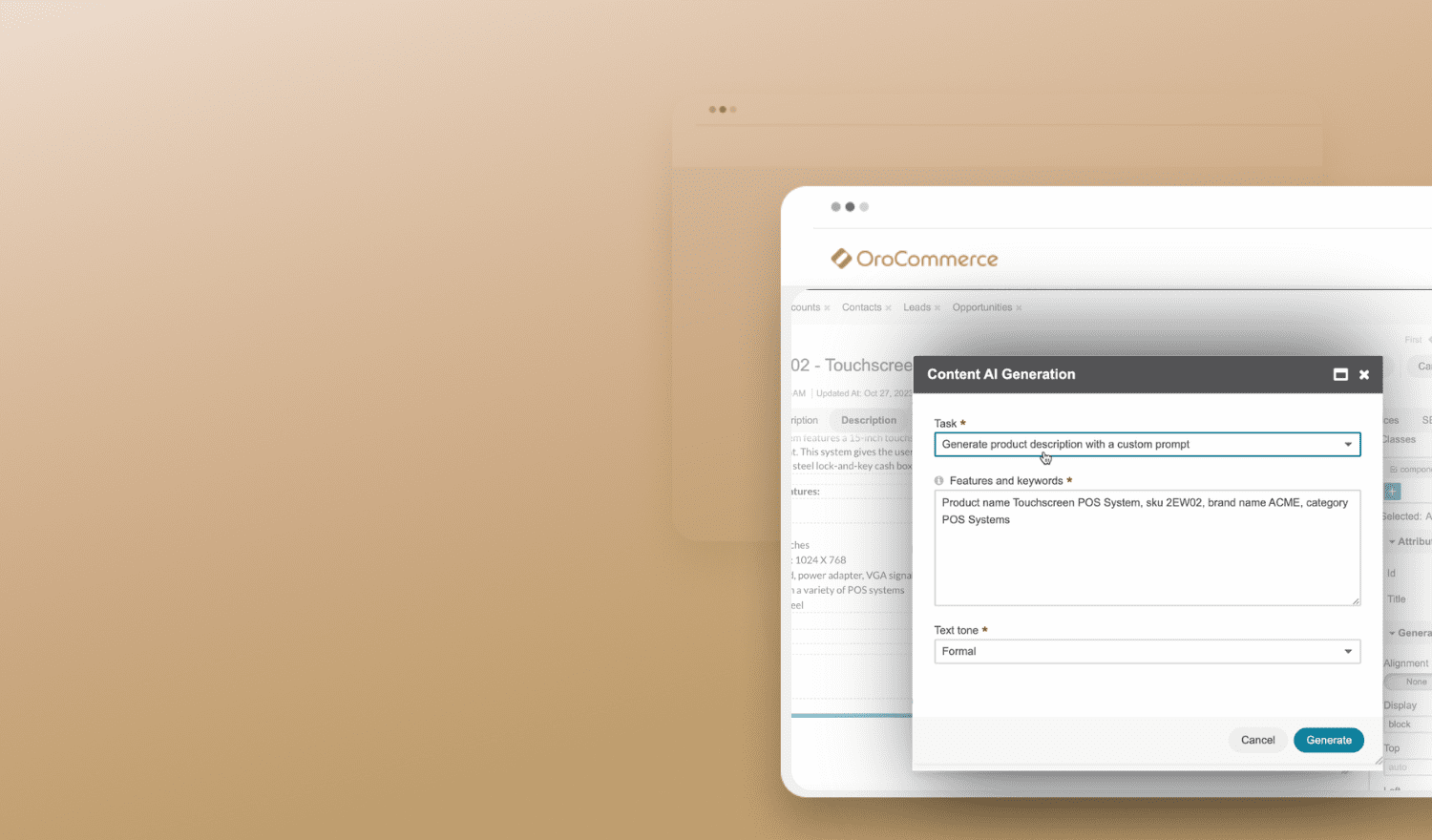Having been a time honored practice in B2C and making its way into B2B, an omnichannel approach to delivering customer experience relies on consistent representation of your company’s brand, product, and quality across a variety of customer touchpoints in order to maximize customer care and sales. These touchpoints may include a brick-and-mortar store, an online eCommerce store, social media channels, a distribution and service partners network, mobile apps, membership programs, and other sales channels. As B2B companies try to adopt best practices from B2C, they need to ensure a balanced strategy for delivering omnichannel B2B eCommerce customer experiences.
Omnichannel Customer Experiences in B2B
Traditionally, B2B companies have had to employ more elaborate sales tactics compared to their B2C counterparts. A manufacturing company, for example, may not have a physical store to showcase their goods and may invest very little in direct advertising. But they do invest into building their distribution networks and attracting more omnichannel retailers to purchase from them- that’s where an omnichannel strategy should come in.
Modern B2B buyers, researchers, and decision makers are getting increasingly more accustomed to an online buying experience, first introduced in B2C. That’s why B2B eCommerce capabilities are growing- having an online presence in today’s market is crucial. Direct sales, exhibitions, and partner programs are still key activities to new customer acquisition in B2B, but even these are getting gradually transformed to support online self-service experiences.
Global digital transformation makes online experiences enabled by eCommerce a dominant trend that grows much faster than traditional channels. B2B companies have to take advantage of this trend in order to stay on top of their game. For example, they can grow their distribution channels by offering personalized web portals to their wholesale clients. They can also reach out to individual buyers on their B2C website or popular marketplaces. They may enhance their loyalty programs for key accounts by merging them with convenient online ordering process. There are many ways in how B2B eCommerce optimizes a company’s sales channels as well as creates new opportunities. That’s why enabling omnichannel customer experiences should start with B2B eCommerce.
How to Optimize Your Existing Channels with B2B eCommerce
So far, online B2B transactions via B2B eCommerce websites, customer portals, and marketplaces account for about 15% of the overall sales. This number alone should provide encouragement to adopt B2B eCommerce, especially considering the fast growth of this industry. But it is also important to understand how B2B eCommerce helps digitize your existing sales channels and thus multiply its positive impact on each B2B company’s omnichannel strategy.
Digitizing for Sales
Sales teams benefit from digital automation by eliminating manual processes and automating repetitive tasks. This frees their time to develop closer relationships with customers and focus on acquiring new business. They can enjoy a more productive day by tapping into a modern CRM, marketing automation, analytics, lead scoring, and reporting tools, all integrated with their B2B eCommerce webstore. These applications help your team to strategically approach, assess, and convert potential customers in a manner that can be continuously tested and improved for better ROI.
Modernizing Distribution Networks
B2B eCommerce helps companies enhance their relationships with wholesalers and distributors to ensure strong channel sales. There are many strategies that can be used to support your channel partners. One could be creating personalized, branded portals for each of your distributors to give them quick access to negotiated contract pricing and custom curated catalogs. This way, they can optimize their restocking routines and better serve their own customers. Other approaches include designating online orders to specific distributors based on predefined criteria, building a multi-website eCommerce solution to represent each of your distributors online and dropship on their behalf, or selling your products online at a premium to ensure your distributors and wholesalers have the price advantage.
Selling Direct to Consumers, Effortlessly
Selling direct to consumers offers numerous benefits for B2B companies, including higher margins, better brand visibility, and access to invaluable customer data. Enabling eCommerce capabilities for your website also makes sense from the SEO perspective. As a product manufacturer, you can offer more content and rank higher in Google compared to your partners and distributors. This makes customers much more likely to land on your website when searching for your type of products or services. Allowing them to buy on the spot is definitely a great way to make the most out of your organic traffic.
Offering Modern Mobile Experiences
Among a large number of marketing strategies adopted by B2B companies to drive sales, eCommerce mobile apps become a major priority. According to Google and Boston Consulting Group, mobile drives, or influences, an average of more than 40% of revenue in leading B2B organizations; they also project that by 2020 the share of mobile traffic will take up as much as 70% of B2B search queries. Other well-documented statistics confirm such high expectations for mobile eCommerce and that it’s steadily growing into a popular channel for eCommerce.
A B2B eCommerce platform should be the bedrock of your mobile innovation, because it provides the essential building blocks for your apps’ business and data processing logic. A robust eCommerce platform will have ways to simplify building or integrating mobile apps in addition to the platform. That’s why the success of mobile eCommerce adoption largely rests on selecting a suitable eCommerce platform for your business.
Taking Advantage of Marketing Automation
Marketing automation unlocks a new world of opportunities for customer engagement and driving sales, and even more so in connection with B2B eCommerce. In a nutshell, marketing automation tools enable you to create, run, and optimize email campaigns while keeping track of measurable data. When you connect your eCommerce store with a tool like MailChimp, you can take advantage of even better marketing automation tools that help you make more sales, such as abandoned cart emails, product recommendations, order notifications, product retargeting emails, product follow-ups, and customer re-engagements.
For instance, you can use Mailchimp to segment your audience to send the right message to the right people. You can also run A / B testing to figure out how to best approach your customer segments. For even more flexible personalization, you can take advantage of Mailchimp’s killer tagging feature that allows you to pull in content specific to each of your contacts to make your marketing feel more personal. Ultimately, you can use Mailchimp to create a personalized shopping experience for your customers and set up automated email personalization based on segmentation, tags, events, timing strategies, and eCommerce conditions.
Building a Stronger Brand
Even if not a separate channel, brand reputation has always played a role in shaping a buyer’s preference, and that’s more prevalent in the B2B segment where customers seek reliability and longevity as much as a compelling price. In their report on brands, McKinsey provides evidence that B2B customers consider the brand a central element of a supplier’s proposition. By their estimate, a company’s brand may constitute as much as a 20% influence on a potential buyer, which is on par with sales efforts. A modern B2B eCommerce website can help you build a compelling brand by offering an effortless buying experience online, including reliable and always up-to-date product catalogs, personalized pricing and loyalty programs, broad payment terms, automated RFQ processing, and many other capabilities.
Technology Integration for Driving B2B Omnichannel Strategy
While B2B eCommerce now becomes a cornerstone of a modern omnichannel B2B enterprise, technology integration is the biggest challenge for companies looking to digitally transform their business. That’s why selecting a B2B eCommerce platform that not only enables you to start selling online but also connects your diverse applications, such as ERP, CRM, Accounting, PIM, CMS, into a cohesive whole is of paramount importance.
In their recent research on best eCommerce platforms, Corevist named direct, real-time ERP integration the key to a robust, scalable B2B ecommerce platform. It was also their conclusion that a large number of popular platforms lack such integration capabilities. They’ve also highlighted the fact that many eCommerce projects fail due to underestimating the burden of getting integration to work “after the fact.”
OroCommerce places a specific emphasis on seamless integrations with popular eCommerce software, such as SAP or Epicor P21, and more- which you can find at our extensions marketplace. OroCommerce also comes with an out-of-the-box CRM solution that allows you to rapidly set up all necessary sales automation processes to support your omnichannel B2B activities from day one.
A successful omnichannel B2B strategy first makes the best use of the existing channels by enhancing it with modern tools, such as B2B eCommerce, CRM, and marketing automation. B2B eCommerce may not going to be your biggest sales channel but it will dramatically improve how you do business on other fronts. And in the meantime, it’s not hard to envisage how online B2B experiences will gradually eclipse any other customer engagement tactics for B2B in the near future. It’s time to get your webstore into order. Read about our customer success stories and how they did it, and contact us for more information and product demo.




